EngageMedia Blog
AJAR's Asian Video Stories

How should societies in Asia respond to extrajudicial killings, military rule, violent extremism–among other mass atrocities–and the lack of accountability over these violations?
To guide responses across various contexts of mass violations, a group of civil society and transitional justice practitioners are building a larger and stronger of Asian experts through the Transitional Justice Asia Network (TJAN).
To guide responses in the many contexts of mass violations, a group of civil society and transitional justice practitioners are building a larger and stronger group of Asian experts from Transitional Justice Asia Network (TJAN). This regional hub aims to facilitate learning and knowledge-building on transitional justice and accountability initiatives across the region. TJAN member organisations include Asia Justice and Rights as network secretariat and KontraS Aceh (Indonesia), ND-Burma (Myanmar), Suriya Women’s Development Centre (Sri Lanka), Alternative Law Groups (Philippines) and the Cross Cultural Foundation (Thailand).
TJAN presents the “Transitional Justice in Asia Video Series”, consisting of six short videos on different aspects of transitional justice. Featuring and narrated by TJAN members who collectively have decades of experience as former commissioners and senior staff of Asian truth and reconciliation commissions, survivors, human rights defenders and academics, these videos can be used in training and advocacy.
Learn more about TJAN here.
To learn more please click this link.
To learn more please click this link. To learn more please click this link. To learn more please click this link.To learn more please click this link.
To learn more please click this link.
Featured Filmmaker: Paradoc
Organisation: Paradoc
Country: Indonesia
Founders: Linda Nursanti and Mada Ariya Putra
 Paradoc is an organisation of filmmakers who work together to create social change using audiovisual media. On their website, they say "Video for Change" is their main type of work.
Paradoc is an organisation of filmmakers who work together to create social change using audiovisual media. On their website, they say "Video for Change" is their main type of work.
One of their most talked-about films is Lakardowo which paints a vivid picture of the people's resistance to environmental pollution by a waste treatment facility in Mojokerto regency, East Java. PT PRIA operates this facility. The residents of Lakardow village have been suffering from groundwater contamination since 2010 and the pollution is also affecting socio-economic and environmental processes in the area. Women and children comprise the highest number of victims.
 Paradoc has received multiple nominations for their works to-date, including the nomination for “Best Feature Documentary” at the 33th Indonesian Film Festival 2018, “Best Feature Documentary (Bekantan Award)” at the 11th Borneo Environment Film Festival 2018 and an Official Selection (Lanskap Program) at the 17th Yogyakarta Documentary Film Festival 2018.
Paradoc has received multiple nominations for their works to-date, including the nomination for “Best Feature Documentary” at the 33th Indonesian Film Festival 2018, “Best Feature Documentary (Bekantan Award)” at the 11th Borneo Environment Film Festival 2018 and an Official Selection (Lanskap Program) at the 17th Yogyakarta Documentary Film Festival 2018.
We talked to Paradoc to learn more about their work.

EngageMedia (EM): What motivated you to form Paradoc?
Paradoc: The name “Paradoc” is based on Mada Ariya Putra's idea of “paradox”. The founders are Linda Nursanti and Mada Ariya Putra who had the vision and mission to make documentary films for social change. It was established in 2016 during the production of a documentary film called Lakardowo Mencari Keadilan - Finding a Fairness in Lakardowo.
EM: Why did you choose the Lakardowo village in Mojokerto for your documentary?
Paradoc: Originally we made the documentary as a part of our educational requirement at the Indonesian Institute of the Arts in Surakarta city. During the research process, we realised that this film could have a larger impact and the Lakardowo environmental issues warranted a larger campaign because this was not being talked about in the mainstream media.
This film reveals that PT. PRIA is dumping hazardous and toxic materials (B3 waste), which is damaging the environment of the nearby areas. The community has criticised the lack of safety and suffering caused by this pollution, which has arisen from industrial growth in the area.
This industrial growth cannot be sustained by maintaining a B3 waste treatment plant and dumping such waste. People, who do not know the dangers of these hazardous materials, think that they are like ordinary sand, so many sell them for building materials. After repeated protests, the government still hasn’t prevented the dumping of hazardous wastes or taken action against industry players that produce waste.Therefore, this film has a big mission.

EM: How did the people of Lakardowo respond to your efforts to make a film about them?
Paradoc: People first welcomed the idea but still approached us carefully, because we were “outsiders”. They were already disappointed with the promises of people (local leaders and politicians) who said they were helping them but were not. Personally, I learned about this case from Ecoton Indonesia, an NGO that has been working with the Lakardowo villagers for a long time. So our initiative got a positive response from the community because they knew we are referred by Ecoton.
EM: Were there any lessons from the film-making process ?
Paradoc: There were many lessons from making this film. For one, we felt that motivation was a must for such filmmaking. The motivation also developed after learning about the conditions or treatments that we have experienced, which could be channeled through the film. This gave a kind of soul to what we really wanted to say. The documentary film also provided information and education to help activists, advocacy media and, especially, the residents of Lakardowo village.
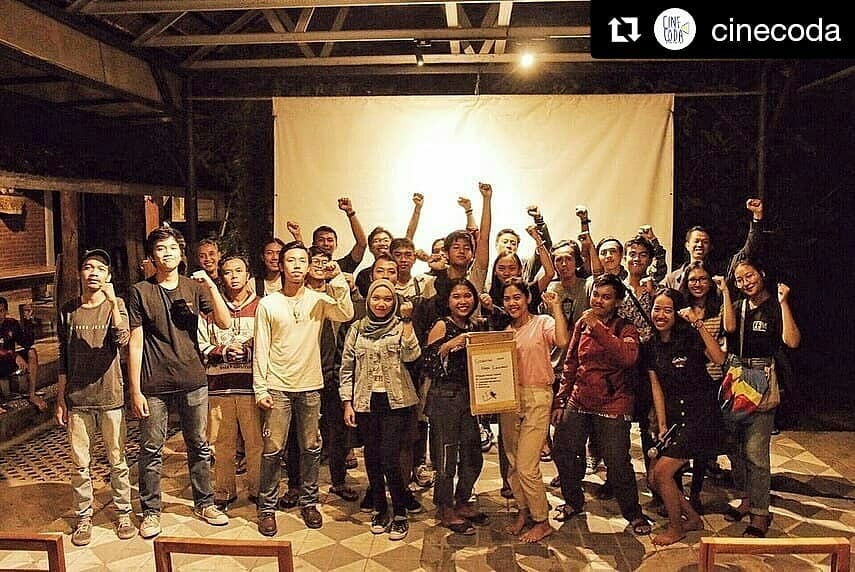
EM: How did the audience respond to this film?
Paradoc: We have seen a lot of enthusiasm from audiences and there has been a high number of requests for access to the film we received after screenings. It was screened in many cities in Indonesia, such as Mojokerto, Yogyakarta, Solo, Tangerang, Jombang, Pasuruan, Malang, Bogor, Denpasar of Java island as well as cities in the Aceh province in Sumatra island and many more to come this year. After watching this film, many decided to show solidarity to the Lakardowo area and its people by visiting them and offering help to the people on the ground.
EM: Do you have any further thoughts about the film you would like to share?
Paradoc: We saw how some members of the audience were emotionally affected after watching this film. They learned for the first time about the dangers of hazardous B3 chemical waste and were appalled by how slow the government response is. This triggered many people, mostly university students, who announced solidarity and pledged to travel to Lakardowo. So the audience took it personally.
EM: Does the online distribution of video help or not? How can we strengthen the advocacy process further?
Paradoc: It is very helpful. With an online network, we can reach more general public audiences. But these activities are never enough. We need to collaborate with other communities or groups to get more support for the cause. Besides the online engagement and the demonstrations in the field, it would be good to increase support by using media art such as music, film, graphics, speeches to talk more about the issue.
EM: What is your plan?
Paradoc: We are currently finishing another film project The Ant and The Elephant. This is also related to the Lakardowo problem. This film will emphasise the ongoing struggle of the people of Lakardowo, especially during the legal battle, which is one of the ways the villagers are fighting the industry giant. The difference from the previous film is that this will be from a more personal and intimate perspective.
Ahu Parmalim and Religious Tolerance

Ahu Parmalim is a short documentary film by Indonesian foundation Kampung Halaman. Founded in 2006 in Yogyakarta, Kampung Halaman offers a space for young people to learn and understand the potential and challenges within their own environments through media. Kampung Halaman focuses on young Indonesians, whom they invite to make video diaries. These diaries are participatory video processes, facilitated by more experienced video-makers, and rely more on the process, than end-results. Final videos are screened locally, followed by discussions with stakeholders. Kampung Halaman runs an online video depot where hundreds of video diaries are archived and made available.

Ahu Parmalim translates to: ‘I am a Parmalim’ in Batak, the local languages spoken by the Batak people in Northern Sumatra. The short documentary follows 17-year-old Carles Butar Butar going about his daily life in Northern Sumatra. Carles is a Parmalim, an active follower of the Malim religion (Ugamo Malim). Viewers are acquainted with the religious practices of Ugamo Malim and get to know Carles as a friendly, diligent and intelligent young man. He is well respected, performs above average in school, and is highly devoted to his religion, family, and his country. Notwithstanding his simple background, his parents are farmers earning just enough to survive, Carles, dreams of becoming a policeman. Through Carles inquiries, we also learn that believing in ‘the one true God’ is a mandatory condition for becoming a policeman in Indonesia.
Every Indonesian citizen is free to choose his/her religion, a right clearly stated in article 28E of the Indonesian constitution. Nonetheless, minority groups and adherents of indigenous beliefs, such as Ugamo Malim, have always been subject to discrimination. They have to struggle not only to receive recognition and protection from the state but also to gain equal access to various public services. Carles’ case is no different. “We learned that Carles was rejected to join the Indonesian Police because he was not a follower of one of Indonesia’s main religions” explains Chandra, manager of education and technology at Kampung Halaman.
This simple, yet intriguing short documentary, made on the sidelines of facilitating video dairies with teenagers in North Sumatra, has been able to open up discussions in Indonesia about religious freedom and tolerance. Ahu Parmalim premiered on International Tolerance Day (16 November 2017) at 40 locations across Indonesia simultaneously. Within three months it was screened over one hundred times. As we near the end of 2018, Kampung Halaman still receives requests for screening. Ahu Parmalim has been screened and discussed all over Indonesia, in Australia, Malaysia and toured briefly in the USA. Initially, screenings took place through network organizations of Kampung Halaman. Hosts received a screening guide and various one-minute animations movies (2 examples of which can be seen at the start of this video) were prepared to introduce and provide background information on key topics.
A special website (in Indonesian) collects past and upcoming screening dates and locations, gives background information, has an online form to collect screening reports and documentation, while those interested in hosting a screening can send in their request here.
After initially posting the film online, Kampung Halaman decided to take it offline and only share it directly with those interested. “We were doubtful that just counting hits would allow us to measure any real impact of the film,” Chandra explains. “The fact that Ahu Parmalim has vastly surpassed its initial goal of twenty screenings and the many comments we are getting from screenings are better indicators for its impact.”
The success of Ahu Parmalim is in part due to national events, occurring completely out of the film-makers control. A ‘landmark ruling’ by Indonesia’s constitutional court, late 2017, officially affirmed the rights of devotees of faiths outside Indonesia’s official recognized religions. From now on these devotees no longer required to identify as either Muslim, Catholic, Protestant, Hindu, Buddhist or Confucian on their national identification cards. This decision and the media whirlwind it stirred in Indonesia provided tremendous momentum for Ahu Parmalim, with many audiences seeking to understand what these ‘alternative faiths’ actually entail. The timing of the release of Ahu Parmalim could therefore not have been better. The director of the film, Cicilia Maharani, acknowledges this fact:
“We are grateful that finally, the film found its own audiences. The discussions after the film screenings created a better understanding of local religion believers like Carles.”
Watch an interview with Cicilia Maharani, the director of the film “Ahu Parmalim”.
Tales from The East Horizon, Revisited
We called it “Tutur Ufuk Timur”, which means Tales From the East Horizon. It is a series of screenings and discussions of videos from Papua initiated by Papuan Voices (PV), EngageMedia and a number of local organisations. The roadshow traveled across six cities in Java from 17 to 26 November 2018, screening mainly films from previous iterations of the Festival Film Papua (FFP).
On 17 November, we began our journey from the west side of Java in Jakarta, Indonesia’s capital. From there, we traveled to an area which much higher altitude: Bandung; co-organising a screening on the 19th with AKATIGA. In the succeeding days, particularly on the 20th and 21st, we were able to have screenings and discussions at the Pusat Studi Sejarah dan Etika Politika (Center for Historical Studies and Political Ethics) at the Universitas Sanata Dharma in Central Java. Much to our delight, we were received with a good number of audience. We then arrived in Semarang on the 24th for an event at the Hall of Santa Theresia Church in Bongsari. Next, we moved to Solo for another event in Rumah Banjarsari on the 25th.
We culminated the tour on the 26th by organising an event in Teater LTC (Learning Training Center) at the Universitas Kristen Satya Wacana in Salatiga. Collectively, around 250 students, researchers, film-makers, clergymen, journalists and human rights and environmental activists.

For a long time, the story of Papua, particularly West Papuan provinces, has been disseminated to other parts of Indonesia through images and narratives produced by state-owned and private broadcasting and print media institutions. To add, West Papua has a few independent media outfits that produce featured films, documentaries and visual news reports, but they do not have enough reach. Through mobile film screenings and discussions we have organised across cities in Java, the aim of EngageMedia and PV was to change the perception of ordinary Indonesians towards the struggles of residents of Papua and West Papuan provinces. In addition, these sessions served as a platform in strengthening external communication capacity of the PV community in order to reach a wider audience.
As we go travel from one city to another, we witnessed the enthusiasm of young people in fighting for social justice and the environment, especially in Papua. Thus, we believe that these screenings and discussions provided the best platform for the PV community to capture feedback, criticism, and suggestions on their work directly from its audience.
Since its inception, films produced by the PV community have been used primarily as media advocacy tools in campaigning about environmental and social justice for West Papua. Previously, EngageMedia and PV have collaborated with other communities that also include educators and researchers. Now, due to its evident potential, EngageMedia and the PV community have been collaborating in organising training programs in Papua to teach filmmaking to local youths.
In 2017, the PV community successfully hosted the first independent film festival ever to be held in Papua: the Papuan Film Festival. It was considered as a benchmark for the film movement in the area. In fact, documentary films that were screened during the festival encouraged young Papuan film-makers to continue producing films that show their struggles as a Papuan and a human being. In addition, the storytelling tradition of their indigenous community helps those who were able to watch their documentaries in sharing its stories with wider and more remote communities. We believe that this also builds awareness among communities on various events, past and present, in a dialectical nature. Moreover, it contributes to the collective effort of discussing civil, political, economic, social and cultural rights of indigenous peoples; and helps initiate a movement towards environmental sustainability for future generations.

The second Papuan Film Festival was held in August this year in Jayapura, Papua. With the theme, “Indigenous Papuans Struggling in the Face of Modernisation”, the festival aimed to increase public awareness on critical issues faced by the indigenous Papuans; and emphasise their role in economic and infrastructural developments in the region.
During the “Tutur Ufuk Timur” roadshow, the majority of the audience who came to watch the films were young educated Indonesians who have daily interactions with colleagues from Papua and West Papua. Papuan students who live in the cities along the roadshow’s itinerary actively participated in the discussions to provide additional context for the films being screened. We are continuously trying to organise this project because we believe that what hinders regulatory and political changes in Papua and West Papua are not institutional issues; but the biased reporting of the mass media that involves discriminatory narratives, intervening and suspecting political expressions as a threat to our national security. This harmful framing continues to be augmented by intolerant groups acting on behalf of the greater Indonesian society.
We sincerely hope that initiatives such as “Tutur Ufuk Timur” will create more platforms for the Indonesian civil society wherein they are able to discuss and understand the real struggles of those in Papua and West Papua.
Engaging South East Asian Film Festivals
From October to December of 2018, EngageMedia went to five Southeast Asian film festivals to share its learnings on social issue documentaries, impact distribution, digital security and Video for Change.
 Filmmakers and activists who attended the Video for Change Discussion in the
Filmmakers and activists who attended the Video for Change Discussion in the Freedom Film Festival - Mending the Gaps
First stop was the 2018 edition of Freedom Film Festival (FFF) in Kuala Lumpur, Malaysia last October. Now on its 15th year, FFF is the biggest human rights-oriented film festival in Southeast Asia. Highlighted this year were the Orang Asli or indigenous peoples of Malaysia; who in the past years have been battling the encroachment of big business in what remains of their ancestral domain. Film screenings, performances and various discussions depicting their situation were held throughout the film festival.
 Melawan Arus traces the undercurrents beneath the waves that swept
Melawan Arus traces the undercurrents beneath the waves that sweptMeanwhile, the closing film Melawan Arus by Arul Prakkash documented the power shift from The United Malays National Organisation to Parti Pribumi Bersatu as narrated by veteran Malaysian activists. The intense discussion during the open forum that followed after the screening reflected the overall feeling of Malaysians prevalent during the duration of the festival--that of desiring to push for as much change that is possible under the new political situation.
Here is an interview of Anna Har and Brenda Danker of the Freedom Film Network we published last year where they talked in details about the 2018 festival "Mending The Gaps".
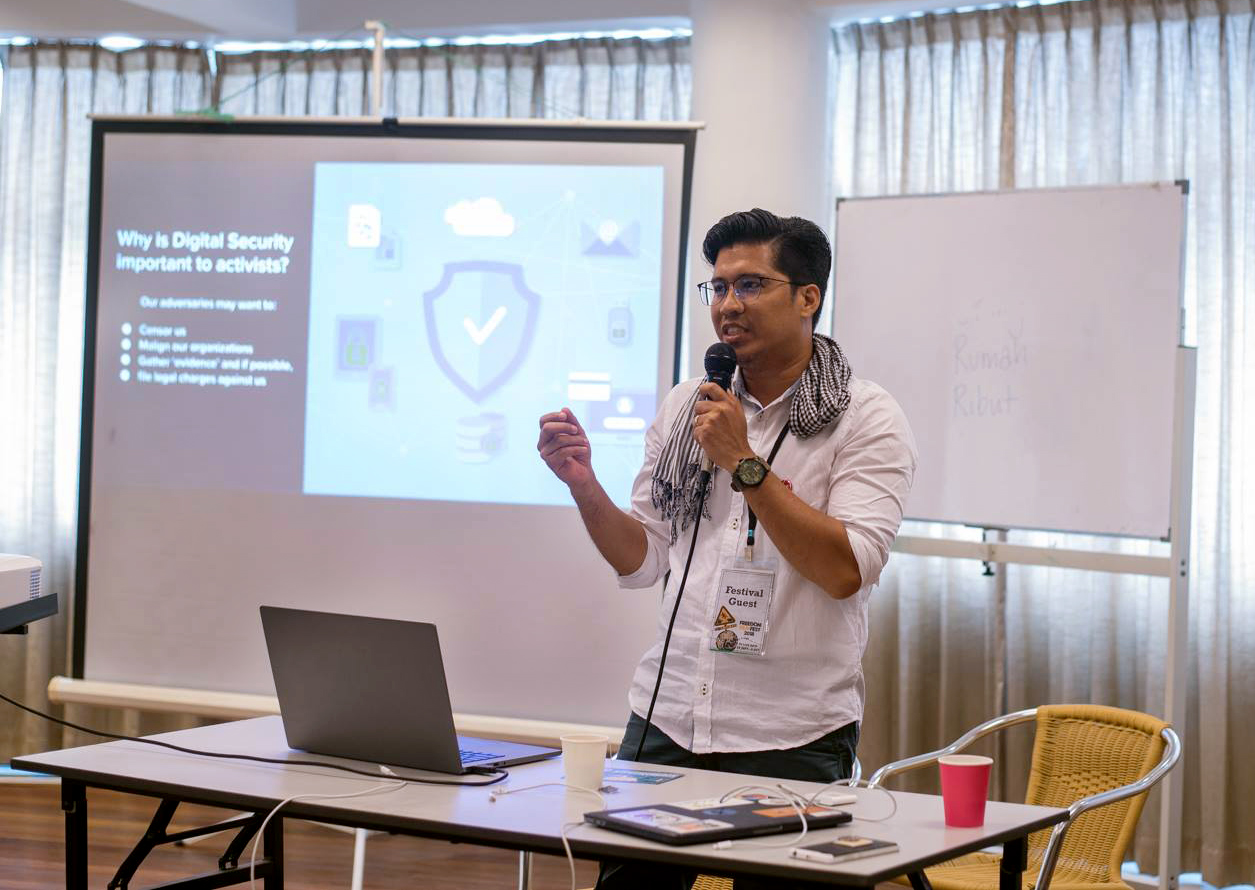 During a session with the Freedom Film Network, EngageMedia featured its advocacy in using Video for Change; particularly in its initiatives in West Papua and Papua region in Indonesia and through the Video4Change Network.
During a session with the Freedom Film Network, EngageMedia featured its advocacy in using Video for Change; particularly in its initiatives in West Papua and Papua region in Indonesia and through the Video4Change Network.
After the screening of Black Code, a documentary on the global impact of the internet on free speech, privacy and activism, EngageMedia co-facilitated a Digital Activism Workshop with WITNESS Asia. It explored online privacy and the right to expression, and how to best utilise video, mobile phones and technology for digital advocacy.
13th Jogja-NETPAC Asian Film Festival
The Jogja-NETPAC Asian Film Festival was founded in Yogyakarta in 2007. It is one of the initiatives of the Network for the Promotion of Asian Cinema (NETPAC), a worldwide organisation founded in 1990 to promote greater understanding and appreciation for Asian films and filmmakers. It has presented the prestigious NETPAC Award for Best Asian Film at 30 film festivals in various countries throughout the world, such as Berlin, Rotterdam, Warsaw, Moscow, Jeonju, Busan and Hawaii.

EngageMedia was invited to the 13th Jogja-NETPAC Asian Film Festival with “Disruption” as its central theme. During the festival, several special screenings, discussions, public lectures and educational sessions took place in various venues across Yogyakarta. On the 30th November, EngageMedia’s Pitra Hutomo and Egbert Wits organised a community forum on social impact and video for change for an audience of about 40 film-makers, activists and students. Read more about it here.
Active Vista International Human Rights Film Festival
Amidst Philippine President Rodrigo Duterte’s war on drugs, misogyny and attacks against his critics, the sixth of the Active Vista International Human Rights Film Festival was launched in Manila last 26 November 2018. This year’s theme, “Imagination”, sheds light on the real stories of human rights struggles despite the dark cloud of disinformation and hate dividing many Filipinos.
 We're holding a session on #Video4Change for #ActiveVista Film Workshop in QC, Philippines as part of #AVHRF2018 #AVFest2018 pic.twitter.com/CUc7GwIqoN
We're holding a session on #Video4Change for #ActiveVista Film Workshop in QC, Philippines as part of #AVHRF2018 #AVFest2018 pic.twitter.com/CUc7GwIqoNEngageMedia facilitated a Video for Change session in the Active Vista Film Workshop, a workshop series that integrates human rights and art advocacy into filmmaking. Attended by young and vibrant filmmakers from various backgrounds, the session was culminated by the collective realisation on the need for more impact distribution efforts of filmmakers, film producers and civil society in the Philippines.
29th Singapore International Film Festival
Fourth stop is the longest-running and largest film event in the Little Red Dot, the Singapore International Film Festival (SGIFF). The festival was widely attended by international film critics who are on the lookout for local and regional talent, as well as emerging trends in Asian cinema. Parallel events like masterclasses, fora and panel discussions hosted by the most prominent personalities of Asian cinema provided opportunities for emerging filmmakers to expand their horizons and to see what is in demand in the sphere of contemporary film festivals.
EngageMedia led a session entitled “Social Issue Documentary and Impact” in SGIFF Connects, a networking session where organisations can hold talks and preview new works. It was attended by an audience of different backgrounds including students, filmmakers and civil society.
It highlighted the idea of Impact Pathway; and the Values and Methods of Video for Change, two key concepts in the Impact Handbook which will soon be released by EngageMedia and Video4Change Network.
Past SGIFF Connects collaborators include Netflix and the Motion Picture Association of America.
Press Pause Luang Prabang
The Luang Prabang International Film Festival is emerging as one of the most significant film festivals in Southeast Asian; but, the organisers were not able to secure a permit from the Lao government last December 2018.Nevertheless, we attended PAUSE, a festival with film screenings, cultural exchanges, and more, which were freely accessible to the public.
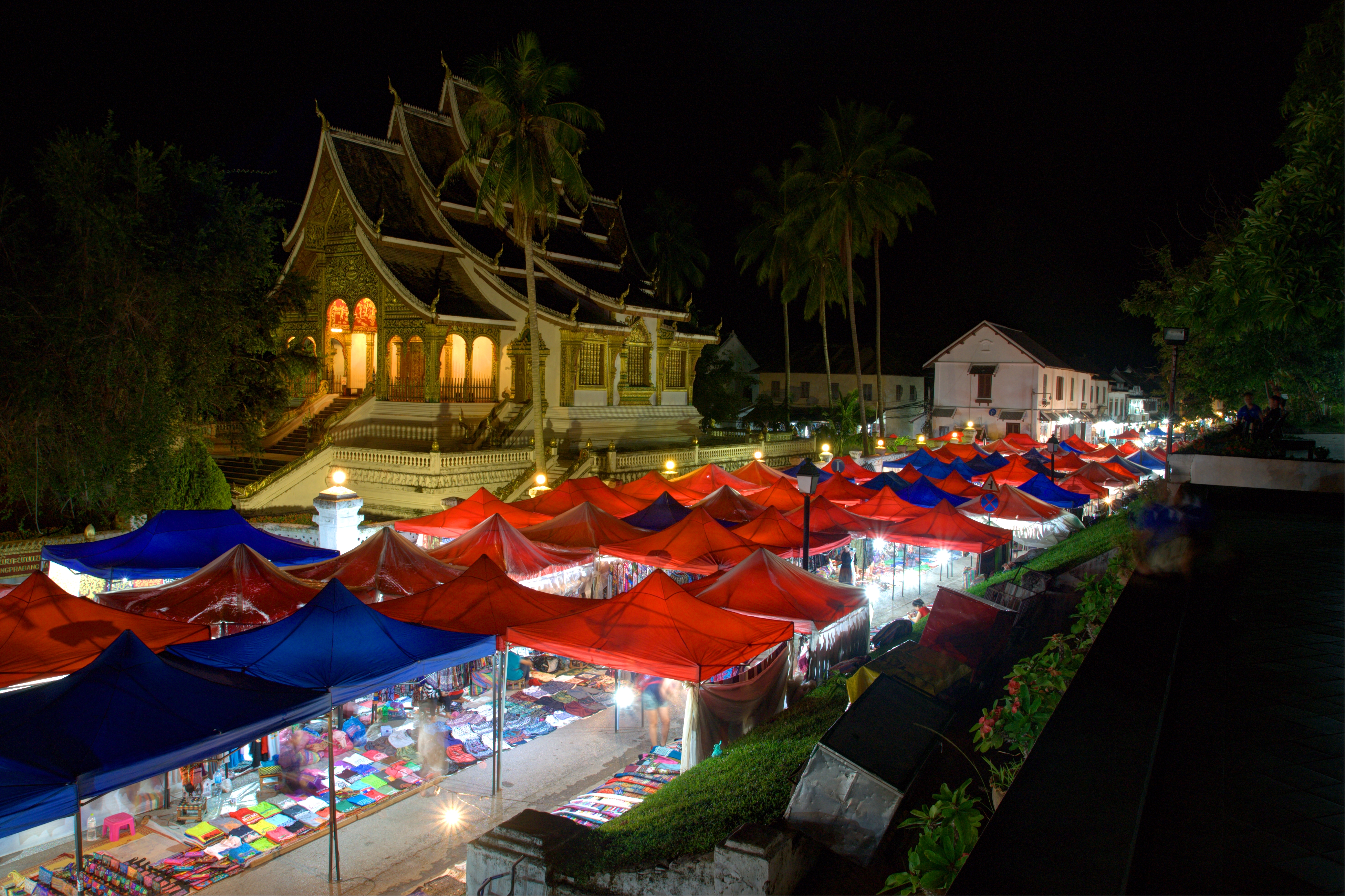
If public screening of films like Edmund Yeo’s We the Dead and and Anucha Boonyawatana's Malila: The Farewell Flower had pushed through, the projection would have been a beautiful complement to the unique architecture of the UNESCO Heritage Site of Luang Prabang.

EngageMedia’s Executive Director Andrew Lowenthal and Video4Change Coordinator King Catoy were two of the panel members of the Film and Social Change Discussion.
They had the opportunity to share their past learnings on the subject matter. King shared the experiences of alternative media groups in the Philippines in filming marginalised sectors; as well as these films’ impact on both online and offline discourses about the worsening human rights situation in the Philippines.

Andrew, for his part, reiterated the role of video in bringing positive change to affected communities facing discrimination, and other issues in the context of EngageMedia’s work.
Reflection
The last four film festivals written here took place within an exhilarating period of two weeks. We had the unique opportunity to see the most relevant films from the region, and even meet some of the filmmakers behind them. It was also an occasion to meet up and coming filmmakers looking for possible collaborators outside the commercial industry who are willing to share their cinematic vision.
Lastly, it was a moment to meet the festival directors, visionaries who see films as not just another blockbuster hit or bust, but rather as artistic statements that reflect the good and the bad of contemporary Asian life and times. Tiring as the journey had been, EngageMedia would not miss a similar chance to do this again in the future.
Accessible Ways to Measure Online Censorship

Cases of Online Censorship in Southeast Asia
In 2017, a game called Fight of Gods was blocked by the Malaysian Communications Multimedia Commission (MCMC), as it is a “[t]hreat to the sanctity of religion and interracial harmony in the country”. Similarly, both Malaysian and Indonesian governments were found to be blocking FanFiction.Net, due to its contents’ homesexual and erotic nature.
Without announcements or justification from the government, it would be difficult to figure out if censorships are being done. We have seen numerous examples of governments’ campaigns against certain types of content that violate their laws and/or values. But how vulnerable is this power to censor content to abuse?
In 2017 as well, 161 websites was banned by the Indonesian government, which included sites that cater to the LGBT community, an independent news outlet based in the United States and a blog that features criticism for the current government. No news, no anything from the government. However, using one tool, Indonesians learned that their access is being controlled by the government.
While there are more sophisticated and time-consuming strategies to measure censorship, Tor Project, which is in the forefront of censorship circumvention and privacy-centric initiatives, developed a much simpler tool that can be used by anyone around the world: the Open Observance Network Interference (OONI) Probe. This very tool helped in realising and validating the censorship of 161 active websites in Indonesia.
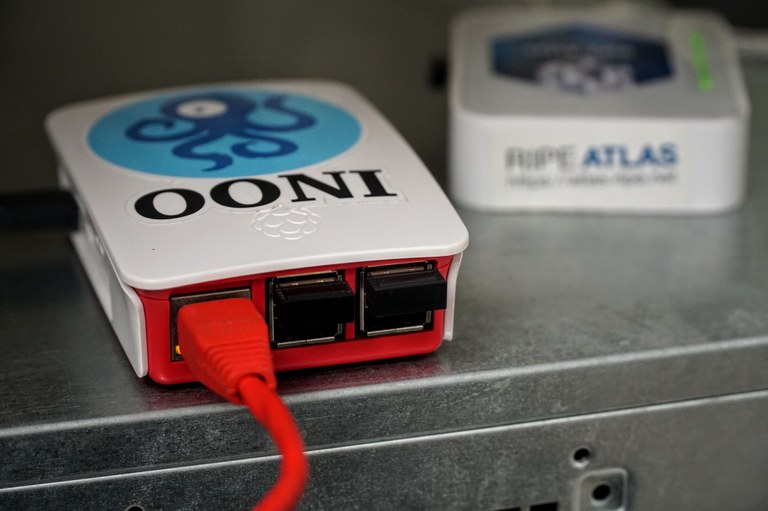
What is OONI
Formulated in 2012, OONI is a “free software [and] global observation network for detecting censorship, surveillance and traffic manipulation on the internet.” As freedom of speech and censorship on digital platforms are relatively new concepts, there are little to no tools that can measure blocking. Unlike traditional censorships in form of shutdowns, similar to the recently ended powering down of TV stations in Kenya, that can be immediately observed with the lack of aired shows and news on TV, journalists and advocates did not have any capacity or knowledge of a tool that would help in proving instances of online censorships in seemingly democratic countries. OONI ultimately aims to answer this.
What OONI Does
In order to do this, OONI runs the probe daily using a working test list of pertinent websites mainly identified by CitizenLab. Each country has its own working test list, which can be downloaded and updated by anyone who is interested. The probe tests censorship per internet subscription or network, as one website can be censored in one, and be completely accessible in another. This is extremely helpful in uncovering and analysing rationales behind every censorship, may it be to hinder the public to in receiving information or due to hidden corporate interests.
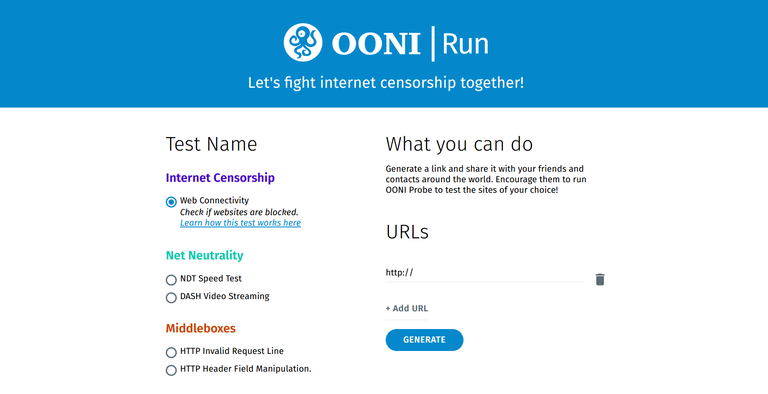
OONI Probe Mobile App
In their desire to operate the probe holistically and involve a much wider set of stakeholders, OONI also developed a mobile app which is available both on Android and iOS devices, which is more accessible and easier to use for the common people. With the prominence of messaging apps such as Facebook Messenger and WhatsApp, the app can be easily used to see if a network blocks access to these apps. Moreover, like a bonus feature, the app also has the capacity to conduct a speedtest. These accessibility features resulted to more people using the app and contributing to the fight for freedom of speech and right to information.
EngageMedia and OONI
EngageMedia continues to explore how it can maximize existing initiatives like OONI to the strengthening of digital rights advocacy in the region. This year, EngageMedia sent a representative to attend a regional workshop on testing and collecting evidence of network interference organised by Sinar Project. This workshop participation led to a small-scale collaboration project of doing baseline probe testing & analysis in the Philippines. [Keep posted to the Link of the Report on the Testing].
Opportunities for Collaboration
OONI, as a platform, is a relatively young initiative and is not without faults. In fact, there were a few instances where evidences of censorship were false positives. It is still in continuous development and needs all the help it can get. Anyone who is willing to contribute to testing and/or finalising test lists can do so by contacting OONI directly at contact@openobservatory.org.
EngageMedia on Video for Change and social impact in Yogyakarta
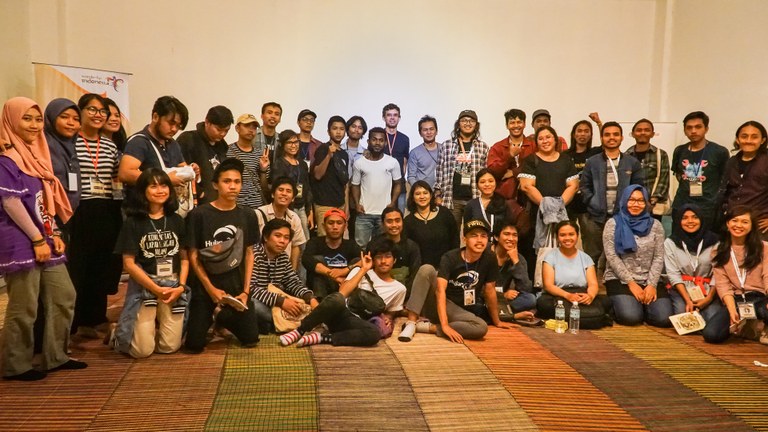
EngageMedia- Yogyakarta was invited at the 13th Jogja-NETPAC Asian film festival. which took place from 27 November to 4 December, with “Disruption” as its central theme. During the festival, several special screenings, discussions, public lectures and educational sessions took place in various venues across Yogyakarta. On the 30 November, EngageMedia’s Pitra Hutomo and Egbert Wits organised a community forum on social impact and video for change for an audience of about 40 film-makers, activists and students.

Pitra launched the forum by introducing EngageMedia and the variety of activities the organisation initiates or has been involved in. She introduced the Papuan Voices program, which has enabled local youth from Papua to tell their stories via documentaries and films. Mama Mariode (2018), a short film from the 2nd Papuan Film Festival (2018), was screened to provide a glimpse of the initiative. The film featured indigenous woman Mariode discussing environmental issues in West Papua and was met with great enthusiasm. It also received a heartwarming applause from the audience.

After which, Egbert then introduced the Video4Change network and EngageMedia’s involvement in the network’s research on social issue documentary and impact. In particular, he shared various aspects of the Impact Pathway, a concept which helps film-makers, activists, individuals and organisations working with video on how to design for and evaluate social impact(s). Through relatable Indonesian films, the audience was familiarised with different types of social changes that can be achieved through video.
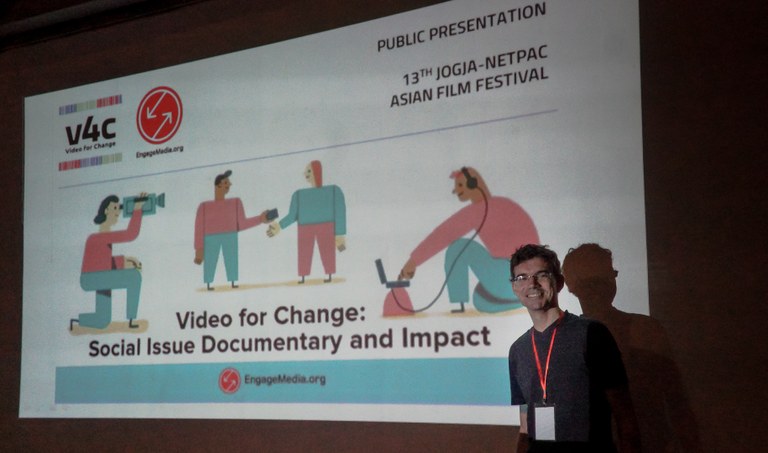
Egbert also stressed that, notwithstanding differences in video for change approaches, there are certain ethical values that all for video change practitioners should respect and uphold. These values range from risk management and inclusion and participation of others to ensuring transparency in expectations and the working process. However, he acknowledged that the implementation of these values is never a one-size-fits-all matter; as all is dependent on risk factors, existing power relations and level of engagement with affected communities.

Before opening the floor for questions, a short video documenting a participatory research was shown. The research is part of Highrise, a long-term collaborative documentary experiment that explores vertical living around the world. It is an excellent example of a participatory process with a strong capacity-building component that led to a positive impact during the research and development stages of a video for change initiative.
At the end of the session, the presenters received several questions, particularly on security. Fortunately, Manu and Thois from Papuan Voice were able to attend the session after their six-city Javanese screening tour. They joined Egbert and Pitra in front, and shared their experiences with regards to the tour and producing issues-based films in Papua. Their stories about dealing with the absence of roads and electricity in several communities, and making the most of simple equipment were inspiring and reminded all those present about the importance of persistence and belief in the process, as contributions to social impact seldom come overnight and are never achieved alone.

Interestingly, a question on how to quickly create more impact was directed to the presenters. Egbert answered explaining that it is more important to be more realistic in setting goals to achieve through the use of video; respectfully advising those who wonder similarly to revisit personal motives and expectations, prior to going out and producing an amazing impactful film.

The session ended with a group photo. Pitra and Egbert were also able to stay around to mingle and discuss with some participants. It was definitely a successful first appearance at JAFF. Hopefully, we will be able to join again next year!
Films shed light on pressing digital rights issues in Myanmar

To commemorate the International Human Rights Day, EngageMedia, along with the Myanmar ICT for Development Organization (MIDO) and Phandeeyar Innovation Lab, organised a film screening and discussion on 16 December 2018 in Yangon. It featured two remarkable short films that showcased the everyday struggles of Myanmar people in fully exercising their human rights online.

This event is a culmination of our collaboration with the movement behind the Myanmar Digital Rights Forum (#digitalrightsMM); bringing in amazing local film-makers: the award-winning Kyal Yi Lin Six and up-and-coming animation and graphic design start-up JOOSK Studios.
“This digital rights film collaboration project channels the power of films to effect change on digital rights, not just for Myanmar people but for all peoples in Southeast Asia,” said Yatanar Htun of MIDO.
Are We Ready?
“Are You Ready?” is a film produced by animation and graphic design start-up JOOSK Studios. It narrates how the Article 66(D) of the 2013 Telecommunications Law has been continuously used by military people and political parties to silence critics and dissenters of the government.

"There have been no effective changes even though Telecommunications Law was amended in 2017. But there were more than 70 cases under the law. Are You Ready reflects the impact of Article 66(d) and it is very helpful to the Telecommunications Law amendment campaigns," said Maung Saung Kha, who was among those who were arrested in 2015 under Article 66(D) for creating and publishing a poem online. He founded Athan, an activist organisation that forwards freedom of expression for the Myanmar people, that just recently won the Human Rights Tulip Award.
It's Time to Talk
Directed by award-winning film-maker Kyal Yi Lin Six, “It’s Time to Talk” visits a day in a life of a female journalist, a Punjabi student-activist and a transgender woman who all have experienced harassment in digital platforms. The film tackles how presumed safe spaces online have become areas for discrimination and harassment.
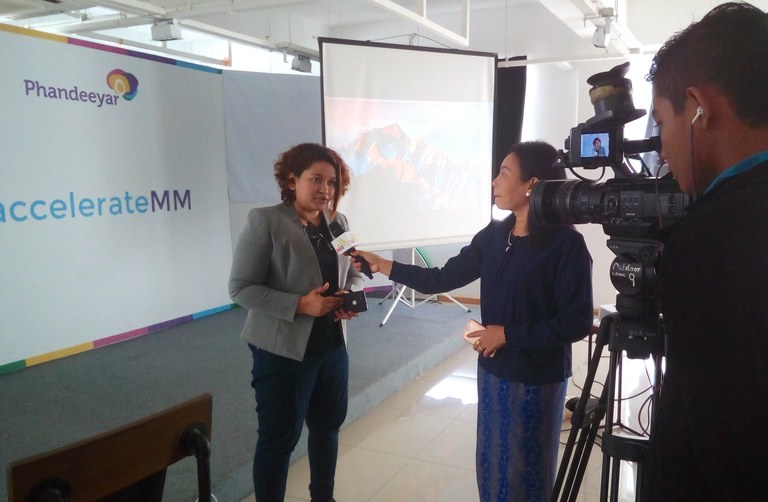
It also outlines possible steps to combat cyber harassment: from changing privacy and account settings on digital platforms to urging key actors to push for changes in culture and behavior.
Myanmar’s Fight for democracy & free speech
“This event is to remind everyone that there are human rights issues that we're all facing when we use the Internet and that we should all work together to address them,” says Ei Myat Noe Khin, Phandeeyar's Digital Rights Manager.

The event, along with the films, hopes to raise public awareness, empower people to speak of their struggles in exercising their human rights online and mobilise more people to call for the immediate attention of the Myanmar government in upholding human rights online and offline.
The film launch event also comes at a critical time, as free speech advocates continue to call for the immediate release of Reuters journalists Wa Lone and Kyaw Soe Oo, who covered the massacre of Rohingya Muslims, a year after their arrest.
-----------------------------------------------------------------------------------------------------------
This film project is made possible by a project grant from the Association for Progressive Communications (APC) and the Swedish International Development Cooperation Agency (SIDA).
The next public screening of the two short films will be during the Myanmar Digital Rights Forum in January 2019. Registration for the Forum can be accessed here. Deadline is on 31 December 2018.
Internet Freedom Is A Basic Human Right

On December 10, we celebrate the International Human Rights Day to commemorate the historic adoption of the Universal Declaration of Human Rights by the United Nations General Assembly on the same day in 1948 in Paris, France.
Today, we will focus on internet rights as a basic human right. For millions of people in the Southeast Asian region, social media, such as Facebook and Twitter, and messaging apps like Line and WhatsApp are extremely popular and have been the main source of information. These platforms tend to be manipulated by certain actors (e.g. government-sponsored troll armies, corporations, political candidates, etc.), which result in disinformation spreading like wildfire. To the authorities, the best response to this is censorship and crackdown affecting freedom of speech of the common people.
Human Rights Online Resolutions
The Association for Progressive Communications, a global network advocating for internet rights, listed United Nations resolutions recognizing human rights online here. As early as October 2009, the Human Rights Council adopted a resolution that recognises the impact of the internet on human rights. It includes the recognition of the importance of all forms of the media, including the internet, in the exercise, promotion and protection of the right to freedom of opinion and expression; calling on States to facilitate equal participation in, access to and use of ICTs, applying a gender perspective.
Since then, numerous resolutions have been produced. In fact, during the 21st and 24th sessions of the Human Rights Council in 2012 and 2013, the States were reminded of their obligation “to respect and fully protect the rights of all individuals to assemble peacefully and associate freely, online as well as offline.” In 2013 as well, the United Nations General Assembly adopted a resolution recognising privacy in the digital age; and even assigning a Special Rapporteur in 2015.
In addition, in July 2018, a resolution entitled “the promotion, protection and enjoyment of human rights on the internet” was again adopted in consensus by the Council.
Diminishing Internet Rights
However, despite the increasing recognition of internet rights, most countries in Asia are still considered either “not free” or “partly free” in the latest Freedom on the Net report. According to the report, there is an observable rise of digital authoritarianism, as governments tighten control over their citizens’ data, and use “fake news” as excuse in order to suppress dissent.
According to the report, there is a decline in internet freedom in Myanmar, India, Cambodia, the Philippines and many more countries around the world. As recently reported, in Myanmar, two Reuters journalists investigating a massacre of Rohingya boys and men were arrested in December 2017, and were later implicated to seven years in prison in August 2018. In addition, the Philippines’s ranking dropped from “free” in 2017 to “partly free” in 2018, due to the increase in libel cases being filed against critics. To add, in India, local internet shutdowns and the proliferation of misinformation and “fake news” across social media can also be observed. In Cambodia, internet freedom restrictions and violations are also on the rise during the leadership of Prime Minister Hun Sen.
The need to fight back
Asia, as one of the world leaders in mobile internet usage with thousands of new technological adopters emerging every day, will be directly affected in the absence of internet rights. This is why there is a pressing need to reiterate that internet rights are a basic human right to be guaranteed by international laws and each country’s constitution. It is high time that human rights defenders in the region to work together to fight for the recognition of internet rights; and pressure authorities to formulate and implement policies in the interest of privacy and free expression.
Internet Rights for Emerging Voices
Projects such as Internews' Internet Rights for Emerging Voices (iREV) was designed to empower local organisations and individuals seeking to advocate for a free, fair and open internet in their communities. iRev shifted Internews’ focus to communities and regions where there is little to no internet freedom advocacy efforts being conducted. In Asia, there are two organisations that are being currently supported by the project: The Bachchao Project in India, and Body & Data in Nepal.
With iREV support, The Bachchao Project aims to focus on building capacity of rural women and fight against internet shutdowns in India; while Body and Data aims to intensify discussions on gender, sexuality and technology with women human rights defenders and tech communities in Nepal.
East Asia civil society strengthens fight against Disinformation
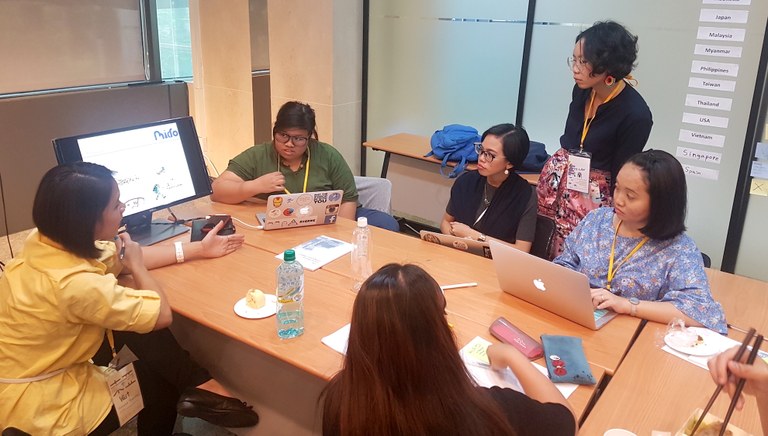
More and more civil society and advocates in East Asia are expressing their concerns on the rise of information manipulation to influence public views and behavior, mislead, incite hatred & fear and even revise factual historical accounts. At the margins of this year's East Asia Democracy Forum in Taipei, the Open Culture Foundation (OCF), together with EngageMedia, the Southeast Asian Press Alliance (SEAPA), and Innovation for Change East Asia gathered digital rights advocates, journalists, bloggers, and citizen journalists from Northeast Asia from China, Japan, South Korea, and Taiwan, and from Southeast Asia from Cambodia, Indonesia, Malaysia, Myanmar, Philippines, Singapore, Thailand, and Vietnam, for a 3-day workshop on June 26-28, 2018, to identify solutions & explore collaborations to combat disinformation in the region.
“We want to discuss the most pressing issue that impacts democracy today, and for us that is the rise of disinformation online. We want to come up with a comprehensive strategy against disinformation,” says Yu Hsuan Chang of OCF. OCF is a Taiwan-based organization supporting local communities advocate for open technologies.
Disinformation in Elections
A lot of countries in East Asia have experienced surge of disinformation on social media, specially during election season. In the Philippines, troll factories were employed to manufacture extremely divisive memes and revisionist historical narratives in the lead-up to the 2016 Presidential elections.
In Malaysia, Maryam Lee, a young feminist activist, recounted being the subject of disinformation during the recently concluded Malaysian general electoral campaign.
Maryam believes that spoiling ballots is a democratic right, and she, along with other activists in Malaysia campaigned for the hashtag #UndiRosak, as they don't want to vote for any of the candidates running that time. She was accused of being financially supported by the then government of Najib Razak. Even media outlets reported that Maryam was being “financially & politically” supported, and there were even posts circulated around that she was paid by Cambride Analytica, the consulting firm accused of illegally sourcing Facebook data using it to influence political campaigns. Maryam adds that the misinformation campaign led to people attacking her based on her gender, even after the elections.
Maryam was one of the participants in the Combatting Disinformation workshop who has pledged to collaborate with civil society across the region to assert that government censorship will never be a solution to address disinformation & misinformation.
During the workshop, there were also groups recommending to engage election monitors to address the disinformation challenge during election campaigns as it can greatly impact the electorates' decision on who to vote come election time. In this joint declaration on fake news, disinformation, & propaganda, released by freedom of expression monitors around the world, including the United Nations Special Rapporteur on Freedom of Expression, media outlets, in line with their watchdog role in society, are also encouraged to consider including critical coverage of disinformation and propaganda during elections.
Fact-checkers vs Disinformation
Fighting disinformation has led to a lot of organizations taking on fact-checking initiatives. There's Fact Check Initiative Japan & Cofacts in Taiwan. In the Philippines, Rappler and Vera Files, both teamed up with Facebook for a fact-checking program to prevent false news from spreading on the social media platform. In Malaysia, there's a very active facebook page called The Malaysian Feminist that fact-checks what is going viral in social media.
GarGar, Project Coordinator of the Myanmar ICT for Development Organization (MIDO), also shares their initiatives on Digital Literacy, and a fact-checking crowdsourcing initiative on social media they call “Real or Not” in Myanmar.
Chihao of Watchout.tw adds their current contribution in the fight against disinformation. “We started as a Congressional watchdog organization. What we do at the core is we fact-check politicians and candidates on their claims and policies, and we find out what they've done in the past based on Congressional records and their past promises. We try to disseminate truthful information to fight disinformation.”
Disinformation Policies & Legislation
One of the key questions in the fight against disinformation is if legislation and/or criminalization the solution. Governments in Southeast Asia are in different stages of developing legislations/policies against what they call “fake news”. In Malaysia, an anti-fake news law was passed just before the elections, and activists and lawyers expressed concern on the speed that it was passed as it was very rushed, and how it will severely undermine right to freedom of expression in the country. In Singapore, according to Law and Home Affairs Minister Shanmugam, the new law to tackle the spread of fake news are expected to be introduced next year.
The Senate Committee on Public Information and Mass Media in the Philippines has also conducted hearings on fake news, which also led to the head of the committee Senator Grace Poe proposing a Senate Bill amending the Code of Conduct for Public Officials and Employees, to penalize those in government who publish and/or spread false news or information in any platform.”
Working Together
A lot of collaborative ideas popped up during the workshop in Taipei proving participants' aspiration to work together even after the workshop. There were groups who want to work on publishing a Study on Disinformation Laws and Policies in Asia that will provide a database of resources on laws, cases, updates, and statistics in the region. There were also groups looking at setting up a disinformation alarm/alert group for building solidarity that will serve as a ‘rapid response’ for journalists and fact checkers assisting each other in combatting disinformation. To address the issue of disinformation during elections, participants were eager in collaborating to monitor disinformation in elections, especially with several elections coming up in the region. There were also activists who are interested to pursue more digital literacy and digital activism trainings focusing on security, as well as looking at getting more converging initiatives of art and technology circles.
EngageMedia plans to support the collaborations identified in the workshop and beyond to also bring to the core the need to expand and strengthen the movement in the region in fighting social injustice and human rights violations online and offline.
Other Readings you may find useful on the topic of Disinformation:
Image credit: EM News


 Subscribe to blog feed
Subscribe to blog feed